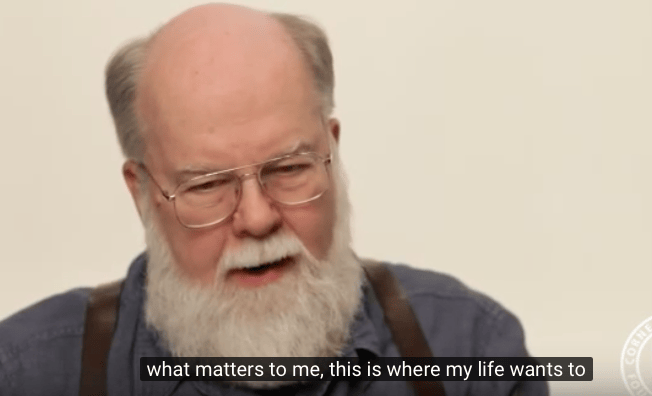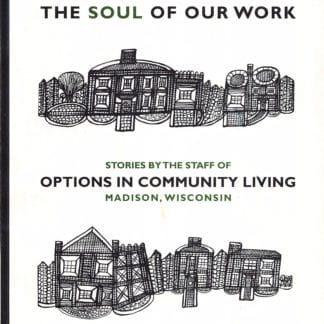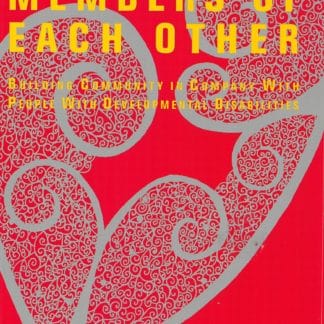Direct Support Workers and an Ethic of Possibility make good lives for all possible. This article explores that possibility. Direct support workers who are guided by an ethics of possibility build a relationship worthy of the trust of the people they assist and the people who love or have loved them. This relationship supports a move across the boundaries that too often separate people with substantial disabilities from the opportunities and relationships that constitute an ordinary good life.
John O’Brien & Connie Lyle O’Brien: Books, Articles & Videos
An Ethics of Possibility
John O’Brien 1
johnwobrien@gmail.com
Ethics is the quest of less and less trivial
modes of human relatedness.
–Herbert McCabe (1968/2003)
When people count on personal assistants to make it through their day, what is possible for them depends to an important extent on the way those assistants show up in their lives. Assistants can show up in trivial ways, as mindless guards or keepers, or in more generative ways as creative allies. How they show up is a matter of of ethics – by which I mean not rule following, but that sense of what is good that informs practical wisdom, shapes human communication and guides action.
Our field has grown accustomed to talking about about a workforce crisis – a growing shortage of personal assistants mostly created by a heartless politics of cheapness that results in poor compensation and low status for the workers that vulnerable citizens depend on for their lives– and it is good that this talk leads to action, such as the initiatives of the National Alliance of Direct Support Providers (see www.nadsp.org). But this important concern need not obscure a search for ways to liberate the energy for good that even people working in straitened circumstances can contribute when they guide their work with an ethics of possibility.
My work with Connie Lyle O’Brien, Beth Mount, Marcie Brost, and Peter Leidy has granted the privilege of discovering the positive difference that the current workforce makes when direct support workers connect with deeper sources of meaning in their relationships with the people they assist. We describe the process by which direct support workers have taught us these lessons in a book, Make a Difference: A Guidebook for Person-Centered Direct Support.
1 Preparation of this article was partially supported through a subcontract to Responsive Systems Associates from the Center on Human Policy, Syracuse University for the Research and Training Center on Community Living. The Research and Training Center on Community Living is supported through a cooperative agreement (number H133B031116) between the National Institute on Disability & Rehabilitation Research (NIDRR) and the University of Minnesota Institute on Community Integration. Members of the Center are encouraged to express their opinions; these do not necessarily represent the official position of NIDRR.
For an example of what we have learned, meet Martin (all names in this ex- ample have been changed). His journey with his assistant, Anna, began from a simple interest: his delight in buying snacks from the day program vending machine and his ability to spend small amounts of pocket money on them. Within the walls of the day program, this small capacity was simply the way to a treat. Anna looked again and saw this small capacity as a possible passport to a bigger world. Carefully, she assisted Martin to buy his snack at a local store. In his small step by small step movement from refusing to get out of the van to feeling the confidence to pick and pay for his snacks, Martin quietly and without words recruited Sandra, a store clerk, as his ally. This led to a next step, stocking shelves in exchange for merchandise, and a next step, stocking shelves for pay.
Sandra and the store were there whether Martin was present or not. Their potential to bring good things into Martin’s life depends on connection. Anna was the midwife for the connection, using her skill to build Martin’s confidence and her creative attention to encourage and build positive contact. Martin and his new allies could then do the rest. (O’Brien and Mount, 2005)
By finding more and more interesting relationships with the people they assist, direct support workers become generators of possibility. This is most powerful when they, like Anna, discover ways to extend and strengthen a person’s network of relationships and valued social roles. The turn toward new roles and relationships is most likely when a person’s assistant holds a conscious purpose to assist the person to show up in ordinary community life as a valued friend and a contributing citizen. Valued friends bring the presence that reflects being seen and encouraged for their capacities and the security that comes from being accepted and supported through difficult times. Contributing citizens make a positive difference by joining their interests and energies to the civic and economic life of their community. The ethics of possibility is a felt sense that direct support is good when it is a relationship which allows the person and the assistant to experience the differences between them, to work through the conflicts that arise between and around them in ways that result in more open communication and less violence, and to support the development of the person’s capacity to play a valued social role.
Direct support workers who are guided by an ethics of possibility build a relationship worthy of the trust of the people they assist and the people who love or have loved them. This relationship supports a move across the boundaries that too often separate people with substantial disabilities from the opportunities and relationships that constitute an ordinary good life.
There are at least two ways to decline the quest for meaning and settle for trivial relationships. A direct support worker can give in to domination and take control of the person’s life as though they were a sort of guard for people who would otherwise neglect or harm themselves or others. At worst this orientation results in the violence of outright abuse. In its more typical form, the worker acts as if the job is to supervise, control, and program an inferior. A direct service worker can give in to laziness and treat the work as though it is simply a matter of performing disconnected tasks, sometimes ironically labeled “doing cares.” Toilet, bathe, dress, feed, transport, run programs and redo. In this mode the assistant acts as a keeper of the incompetent, uninteresting, and stuck. Both domination and laziness can be justified by an ethic of rule-following, as “just doing my job.” Control can be seen as prescribed by regulations enforced to assure the abstraction of “health and safety.” Laziness can be justified by rote conformity to care plans made and checked by the bosses.
Many direct support workers rise above showing up in people’s lives as guards or keepers and show up as good company. They genuinely enjoy their time with the person they assist. They may come to know and care for the person, want to share some of the good things in their own lives with the person, and speak up for more of what they believe is important to the person. People who have assistants who show up as good company usually reciprocate and may express previously undisclosed interests or ca- pacities. This sort of relationship can be far from trivial, but, in light of the ethics of possibility, it stops short of joining the person in an alliance that not only offers good company but also energizes a turn outward, into new relationships and new valued social roles.
Many current ways of organizing and managing shut down the generators of possibility, shrinking the range of communication and action, draining the work of meaning, and feeding the cycle of turnover and adverse selection that drives the workforce crisis and results in unknown and unknowable loss to people with disabilities and their communities. Forming and sustaining direct support relationships that create new possibilities defines the fundamental task for managers and policy makers and the most meaningful measure of the quality of their performance.
Our collaboration with direct support workers, and employers interested in supporting their development, has shown us five investments that awaken and encourage the ethics of possibility among direct support workers (See O’Brien and Mount, 2005 for a systematic guide).
- Time to invest in trying new things in a freely chosen partnership with a person who consents to joining the direct support worker to explore the possibilities for contribution offered by his or her neighborhood and community.
- A context for understanding the power of devaluing social expectations and the possibilities that come into view when people break out and seek ways to expand valued experiences.
- A structure for shared learning that allows gathering a sense of the person’s capacities, searching for productive community connections, and negotiating for more precise assistance. The archetype of a journey has proven a powerful structure.
- An emphasis on learning by taking action in the community, seeking out, as quickly as possible, new people with whom to try new things rather than talking and planning or tinkering with things within current boundaries.
- The means to guide and express learning by creating beauty through the ordinary means of art, craft, music, and story that have encouraged, consoled, and instructed people from time out of mind. The ethics of possibility reaches deeper than the modern languages of management and professionalism can touch; it is invoked and communicated aesthetically (Garcia Rivera, 1999). Even the shy and the self-conscious among direct support workers have communicated powerfully when they are part of a group of learners invited, assisted, and celebrated for seeing beauty in those they support, walking in beauty with those they support into new opportunities, and communicating with beauty that which they have learned.These may seem like big investments of questionable relevance to dealing with scarce money, scarce people to do the work, and the demands of compliance with an insanely proliferating tangle of requirements. They do, however, offer a way to bring alive and keep alive the meaning in the work of assisting people whose opportunities for social participation depend on whether or not the assistance they receive is guided by the ethics of possibility.
References
Garcia Rivera, A. (1999). The community of the beautiful: A theological aesthetics. Collegeville, MN: Michael Glazer.
McCabe, H. (1968/2003). Law, love and language. London: Continuum.P. 99.
O’Brien, J. and Mount, B. (2005) Make a difference: A guidebook for person-centered direct support. Toronto: Inclusion Press. www.inclusion.com




